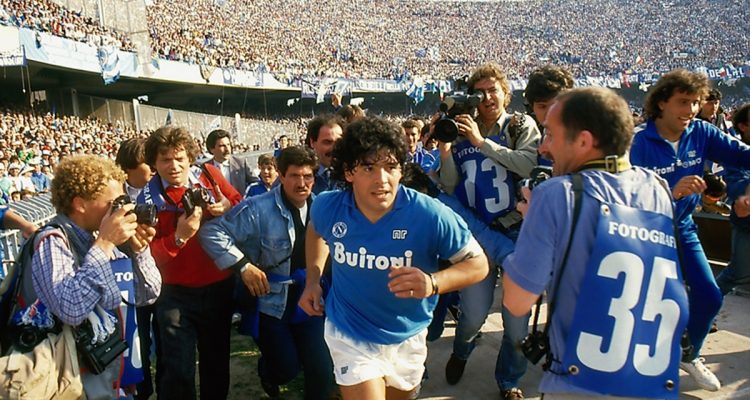Infamous footballer (or soccer player, for our American readers) Diego Maradona has a history with the Cannes Film Festival, which previously hosted “Maradona by Kusturica” in 2008. This time, however, the sports icon is the subject of a new documentary from Oscar-winning British helmer Asif Kapadia (“Amy“). It’s pointed that “Diego Maradona”—premiering out of competition at Cannes in advance of its HBO debut—includes both the first and last name of its subject in the title. The documentary in question is a double-barreled look at the figure’s two faces; Diego, a young athletic prodigy from Argentina and Maradona, the egocentric public-facing sports superstar. Kapadia’s tight focus and compelling viewpoint make “Diego Maradona” a must-see for soccer fans, and certainly a biographical doc of interest to wider audiences.
“Diego Maradona” spans the footballer’s contract with S.S.C. Napoli, from 1984 until his painfully public fall from grace in 1991. It’s a roller-coaster highlight reel of Maradona’s career with particular attention paid to Argentina’s World Cup win in Mexico in 1986 and loss in the finals in 1990, as well as championship victories in the Serie A, Italy’s premier football league. A cause célèbre on an unprecedented scale for the Campania capital—treated, as one of the narrators notes, like a demigod—Maradona is early on photographed with members of the Camorra crime family, a connection which leads to a career-ending downfall.
READ MORE: 2019 Cannes Film Festival: The 21 Most Anticipated Movies
Voice-overs guide us through Maradona’s period in Italy; speakers include journalists, historians, friends, family, and the icon himself. The biographical “Diego Maradona” is enriched with historical context. A reference to the Falklands War sets the scene for the tense encounter between the Argentine and English sides at the ’86 World Cup, The ensuing profane abuse from the Brits in the crowd makes that much more sense, barely audible in the uproar of the stadium. The doc is also a tale of Naples and its people, who find redemption in the celebrity despite his high price-tag to the city. When Maradona and Team Argentina are bracketed against Italy, the Neapolitans have their day of reckoning.
Kapadia’s ballsiest choice in telling Maradona’s story is to downplay the notorious ‘Hand of God’ moment in the semi-finals of the 1986 Mexico World Cup. Of course, it can’t be avoided the game-winning infraction is central to the Maradona legend. The controversy and his notorious soundbite—‘The goal was scored a little bit by the hand of God, another bit by the head of Maradona’—has become an all-consuming aspect of footballer’s legend, and the documentary chooses to find a different way into the footballer’s biography, via the intimate relationships in his life as well as his meaning for the Neapolitan public.
There is nary a talking head in sight; “Diego Maradona” is entirely sourced from archival images, with the exception of a few establishing shots. Tattered black-and-white photography of the Buenos Aires slums emerges from an entirely different world, selling the distinction between the real person and the cult of personality. The bulk of the clips from the 1980s are sourced from tape footage, including news broadcasts and recordings of Serie A matches.
The real treats, however, are the World Cup games from both 1986 and 1990—an impressive blend of tape stock and celluloid. While it’s not much of a surprise that the monolithic FIFA is taking charge of their heritage, the restored 35mm footage capture a grainy immediacy and makes an argument for the documentary as a big-screen must. It’s a deeply impressive feat from an editorial perspective, seamlessly integrating the two mediums to express a sharpened point of view.
A dynamic score by Antonio Pinto (“Collateral,” “City of God”) covers a range of tones. The highlight is the theme employed for the soccer matches themselves, lending an urgency to the balletic orchestration of bodies on the field. Off the pitch, lofty string compositions play up the glory of Maradona’s lifestyle.
Maradona’s lack of humility both in victory and defeat makes for quite a spectacle that’s exemplary of the public figure’s inflated ego. True to its subject, there is a great deal of soccer footage in “Diego Maradona”—to the point of being repetitive—and at 130 minutes, your mileage may vary in terms of sustained interest. Regardless, Kapadia is a very capable documentarian, funneling the icon’s life through a precise lens. Fleet-footed Maradona once gloats, ‘Football is a game of deceit.’ Perhaps “Diego Maradona” is a misdirect, deifying the superstar and eliding his less flattering qualities. As far as distractions go, though, it’s pretty diverting. [B]

